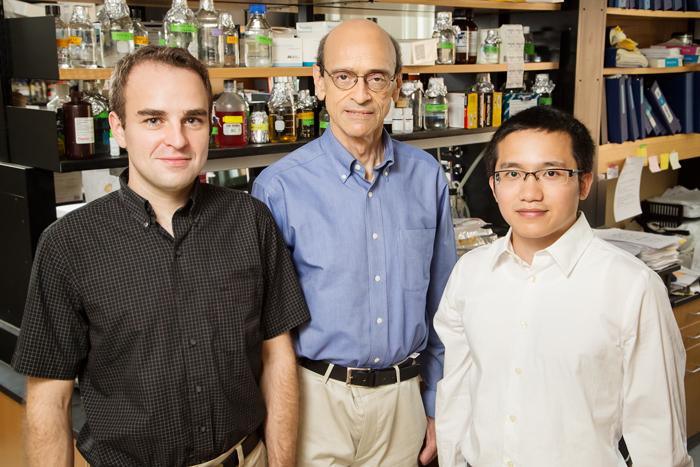Scientists discover a new role for estrogen in the pathology of breast cancer

U. of I. biochemistry professor David Shapiro (center), M.D.-Ph.D student Neal Andruska (left), graduate student Xiaobin Zheng and their colleagues discovered a new mechanism by which estrogen contributes to the pathology of breast cancer. Credit: L. Brian Stauffer
The researchers say the work reveals new targets for breast cancer therapy and will help doctors predict which patients need the most aggressive treatment. The University of Illinois team reports its findings in the journal Oncogene.
Estrogen pre-activates the unfolded-protein response (UPR), a pathway that normally protects cells from stress, the researchers report. The UPR spurs the production of molecular chaperones that prepare cells to divide and grow. Without chaperone proteins to do the work of folding and packaging other proteins, cells – including cancer cells – cannot divide. For this reason, chaperones are a popular target for new cancer therapies.
Activation of the UPR is known as a normal response to stress – when a cell lacks adequate oxygen or nutrients, for example, or is exposed to cancer-killing drugs. UPR activation prepares the cell for major changes associated with cell growth, division and survival under stress.
It wasn't known before this study, however, that estrogen initiates this pathway before such stresses appear, said University of Illinois biochemistry professor David Shapiro, who led the new analysis with lead author, M.D.-Ph.D.-student Neal Andruska.
“This is a new role for estrogen in the pathology of cancer,” Shapiro said. “Others have shown that stress activates this pathway, helping to protect some tumors. What is new is our finding that estrogen can pre-activate this pathway to protect tumors.”
When estrogen binds to its receptor it sparks a cascade of molecular events in the cell. A key event occurs when a channel opens in the membrane of a compartment that stockpiles calcium, and calcium floods into the cell.
“That's a signal to activate the UPR pathway, the stress pathway,” Shapiro said. “It's also a signal that many researchers think has something to do with cell proliferation. The calcium itself may be a proliferation signal.”
The stress-response pathway induces the production of chaperone proteins.
“I like to think of this pathway as an assembly line,” Shapiro said. “In order for cells to divide, you're going to have to produce a lot more proteins. The chaperones help you to package, fold up and ship all these proteins.”
The UPR also is a mediator of cell death. If a normal cell is exposed to too much stress, the stress response spurs apoptosis, a kind of cellular suicide. In cancer, however, mild activation of the UPR by estrogen blunts this cell-death pathway, allowing cancer cells to survive and even resist drugs, the researchers found.
The team also looked at the expression of UPR-related genes in publicly available data from samples of breast tumors obtained from women who had been diagnosed up to 15 years prior.
“Andruska, who spearheaded the research and carried out the computer analysis of the breast cancer data, found that UPR activation is a very powerful prognostic marker of the course of a woman's disease,” Shapiro said.
The analysis revealed that among women with estrogen-receptor-positive breast cancer who underwent tamoxifen therapy, breast cancer was 3.7 times more likely to recur in those overexpressing the UPR. Ten years after a breast cancer diagnosis, only 15 percent of those with the highest level of UPR-gene expression were disease-free, compared with 80 percent of women with minimal UPR expression.
“Our marker helps identify breast cancers that are likely to be highly aggressive and therefore require intensive therapy,” Shapiro said.
U. of I. graduate student Xiaobin Zheng, postdoctoral researcher Xujuan Yang and food science and human nutrition professor William Helferich contributed to the research.
The National Institute of Diabetes and Digestive and Kidney Diseases at the National Institutes of Health funded the research.
Editor's notes:
To reach David Shapiro, call 217-333-1788; email djshapir@illinois.edu.
The paper, “Anticipatory Estrogen Activation of the Unfolded Protein Response is Linked to Cell Proliferation and Poor Survival in Estrogen Receptor Alpha Positive Breast Cancer,” is available to members of the media from the U. of I. News Bureau.
Media Contact
More Information:
http://illinois.edu/All latest news from the category: Health and Medicine
This subject area encompasses research and studies in the field of human medicine.
Among the wide-ranging list of topics covered here are anesthesiology, anatomy, surgery, human genetics, hygiene and environmental medicine, internal medicine, neurology, pharmacology, physiology, urology and dental medicine.
Newest articles

Properties of new materials for microchips
… can now be measured well. Reseachers of Delft University of Technology demonstrated measuring performance properties of ultrathin silicon membranes. Making ever smaller and more powerful chips requires new ultrathin…

Floating solar’s potential
… to support sustainable development by addressing climate, water, and energy goals holistically. A new study published this week in Nature Energy raises the potential for floating solar photovoltaics (FPV)…

Skyrmions move at record speeds
… a step towards the computing of the future. An international research team led by scientists from the CNRS1 has discovered that the magnetic nanobubbles2 known as skyrmions can be…





















